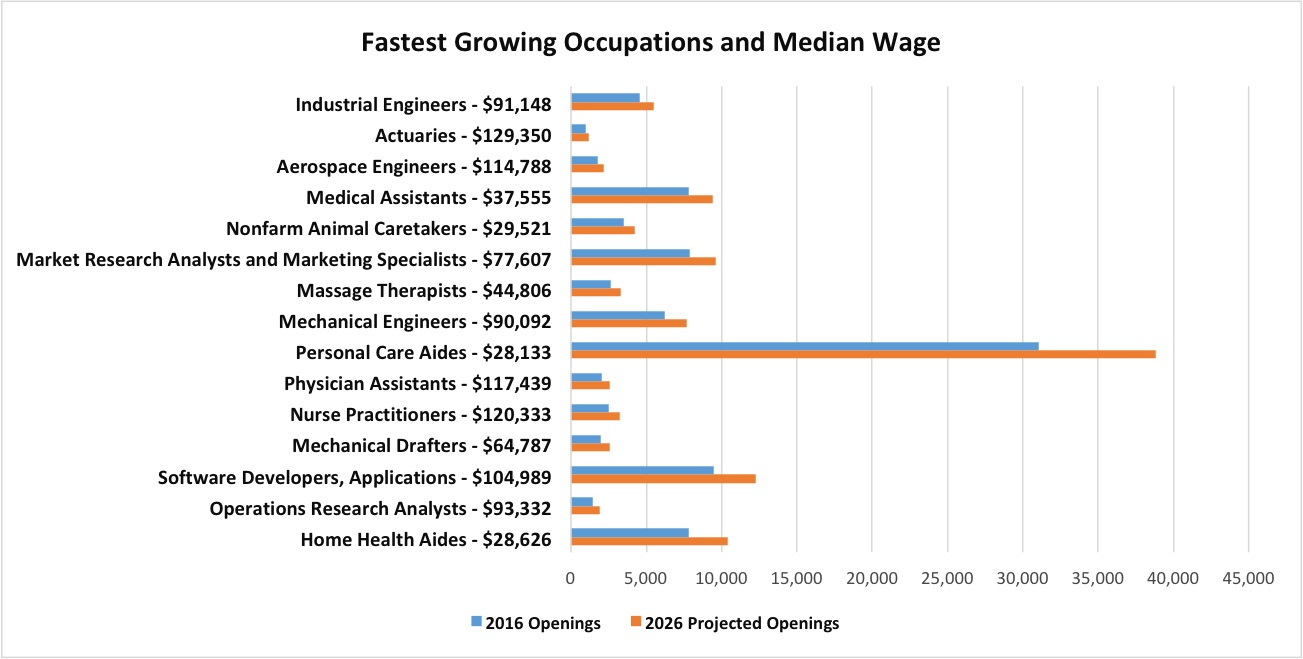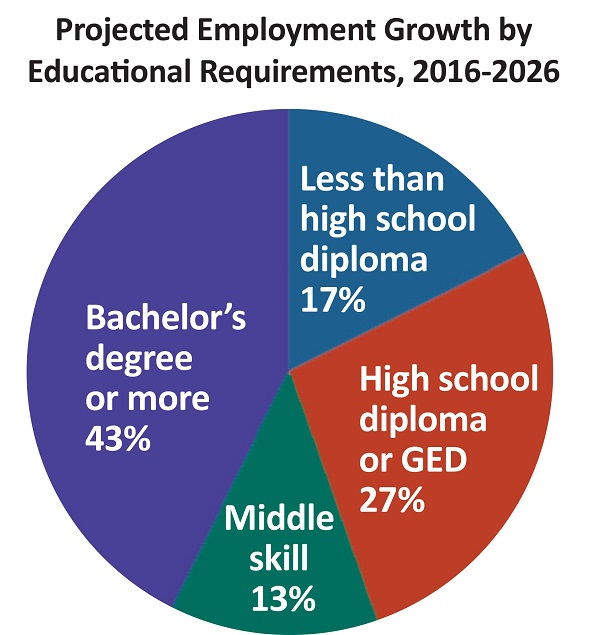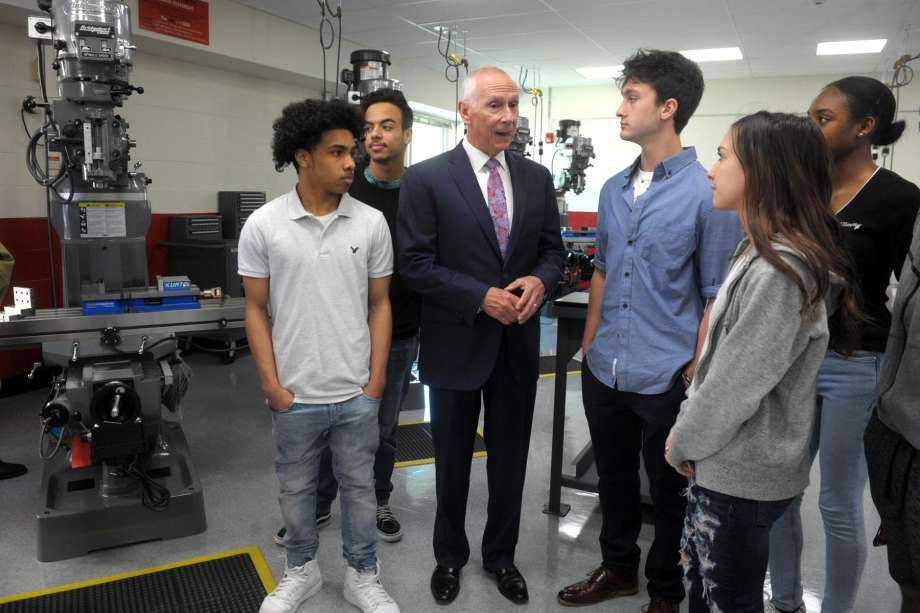Education, Skills and Training for 21st Century Jobs
The workforce needs access to the right skills and education to meet the demands of employers in growing industries.
Strategies for a Growing and Inclusive Economy
When industrial factories powered the Greater New Haven economy, there was an abundance of jobs with minimal education requirements. What a worker needed to know could be learned on the job, and there was a good chance that job could support a family. Those days are long gone.
An education beyond high school is now a minimum requirement for most of the jobs that provide a base level of financial security. Many workers in low-wage occupations are forced to take second and third jobs to make ends meet. After a decade of lagging behind other regions, Connecticut's economy is gradually improving and projected to add jobs in high paying fields such as computing and skilled manufacturing. To meet this demand, and enable the economy to grow in an inclusive way, the workforce must have access to the right education and training.
The Numbers
(Click on image for updated data from CT Dept. of Labor)
 |
| Source: CT Dept. of Labor Fastet Growing Occupations in Connecticut. |
Climbing Out of the Recession
The 2008 recession caused the worst job losses over a longer period than any previous recession since World War II.1 After bottoming out in 2010, the national economy has since improved to pre-recession levels. While Connecticut ranks at the bottom of most indicators for economic growth over the past decade, its total employment is expected to grow by 5.9 percent
through 2026.2 Greater New Haven is a bright spot in the state, ranking above the other metro areas and the state average in the Department of Labor's Connecticut Town Economic Index.3
Where the Jobs Are
 |
| Source: CT Dept. of Labor |
Nearly every major occupational group is expected to add jobs in Connecticut, led by health care.4 Within healthcare, medical assistant is the fastest growing "middle skill" occupation, which requires more than a high school diploma but less than a bachelor's degree. Other sectors projected to grow the fastest include professional, scientific and technical services and social assistance. Manufacturing, despite declines nationally, is expected to grow in Connecticut, reversing a decline since the 1990s.5 Because Connecticut's manufacturing workforce is older, the sector faces the challenge of finding enough skilled workers to take the new jobs and replace retirees.
The Need for Education and Training
With a majority of the state's job growth in occupations that require more than a high school degree, there is an urgency to ensuring that Connecticut residents have access to the needed education and training.6 For adults, a postsecondary education with a degree or industry-recognized credentials related to jobs in demand is the most important determining factor in a worker's lifetime income. For youth, the best outcomes are associated with early exposure to a range of education and career options, opportunities to work during the summer, and internships that offer learning on the job.7
Innovative Solutions in Greater New Haven
Access to Higher Education: New Haven Promise provides free college tuition and internship opportunities to New Haven public school graduates who qualify based on their grade point average, attendance and community service. Since Promise launched in 2010, graduation and college acceptance rates have risen in New Haven. The program has also built relationships with more than 60 local organizations that offer internships, making it the largest internship program for young people in the region.
 |
| At Derby High School's Advanced Manufacturing Center, students learn how to model designs on computers and work in a machine shop through an innovative collaboration between the state, Asnuntuck Community College and Housatonic Community College. Photo Credit: Ned Gerard / Hearst Connecticut Media |
Bio-Path: Greater New Haven is home to the second largest cluster of biotechnology companies in New England. Bio-Path is a partnership between the City of New Haven and Southern Connecticut State University to support this growing economic sector through academic pathways and workforce development.
Manufacturing Skills Pipeline: A 2013 report by the Connecticut Policy Institute (CPI) entitled, "Building Connecticut's Workforce - Integrating Career Education with Employer Needs" found that many employers in advanced manufacturing have unfilled job openings. State community colleges are teaming up with local high schools to address the need. Hamden Engineering Careers Academy (HECA), a collaboration between Hamden Public Schools, Gateway Community College, The New Haven Manufacturing Association and the Town of Hamden offers students an opportunity to earn an Associate of Science Degree from Gateway Community College in Manufacturing Engineering concurrently with a high school diploma. At Derby High School's Advanced Manufacturing Center, a collaboration between the state, Asnuntuck Community College and Housatonic Community College, students are learning how to model designs on computers and work in a machine shop.
Middle Skills: Connecticut Center for Arts and Technology (ConnCAT) provides job-training programs intended to give unemployed and under-employed adults the skills needed to secure well-paying jobs in the health sciences and culinary fields.
Reentry: In urban centers, the prison reentry population faces major barriers to finding sustained employment. Emerge Connecticut, in New Haven, has gained recognition for providing formerly-incarcerated men and women with paid on-the-job training combined with basic educational instruction.
What The Community Foundation is Doing
Inclusive Growth: The Community Foundation is engaging local leaders to support inclusive growth, a strategy for building an economy that benefits all residents.
Recent grants and investments in education and skills training have been made to the following organizations:
- All Our Kin
- The Connecticut Center for Arts and Technology (ConnCAT)
- Emerge CT
- Gateway Community College
- Holberton New Haven
- New Haven Promise
- Career Resources Inc., Strive-New Haven
Sources
1. Employment loss and the 2007–09 recession: an overview. Monthly Labor Review;
2. Long Term Industry and Occupational Projections: 2016-2026. The Connecticut Economic Digest September 2018:
3. 2017 Connecticut Town Economic Indexes. Economic Digest October 2018
4. The Connecticut Economic Digest September 2018
5. Ibid
6. What Works In Job Training. U.S. Department of Labor, U.S. Department of Commerce, U.S. Department of Education, U.S. Department of Health and Human Services, July 2014.
7. ibid
